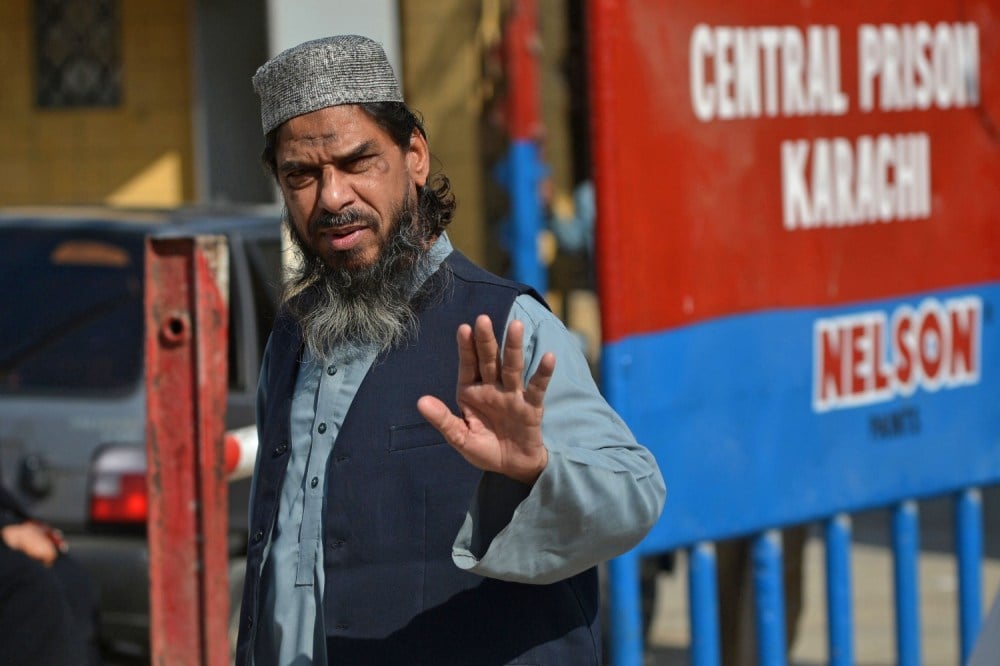The acquittal of Daniel Pearl’s abductors came at the worst possible time.
BY
MICHAEL KUGELMAN
On Jan. 28, Pakistan’s Supreme Court
ordered the acquittal of four men convicted of abducting and murdering the
Wall Street Journal reporter Daniel Pearl. The ruling upheld a lower court decision in Sindh province last year—appealed by Pakistani government officials—that overturned the murder convictions, found them guilty of kidnapping charges only, and ordered their release because they had already served enough time on the less serious charge.
The Biden administration reacted strongly. White House Press Secretary Jen Psaki said the United States was “
outraged.” She
described it as “an affront to terror victims everywhere.” Secretary of State Antony Blinken, in a lengthy written statement,
said the United States was “deeply concerned.” Washington is particularly unhappy about the acquittal of Ahmed Omar Saeed Sheikh, widely believed to be the mastermind of Pearl’s abduction and a longtime, card-carrying member of the Islamist terrorist elite.
There’s never a good time for convicted terrorists to be acquitted, but the ruling has spoiled a rare bright spot in an often-troubled U.S.-Pakistan relationship. U.S. President Joe Biden has been keen to cooperate with Pakistan to advance a floundering Afghan peace process, and Islamabad has called for a reset of the relationship that expands cooperation into non-security spaces. Both goals, but especially Islamabad’s, will now be harder to achieve.
Pakistani militants snatched Pearl in Karachi in January 2002. They held him captive for more than a week before decapitating him, slicing his body into 10 pieces, and burying his remains in a shallow grave. The sickening crime set terrible precedents. Journalists became a favorite abduction target for Islamist terrorists, and militants began producing execution videos like the one filmed by Pearl’s killers.
Pakistan’s Supreme Court ruling amplifies long-standing tension points in U.S. relations with Islamabad. One is Pakistan’s failure to keep terrorists who target the United States or its interests behind bars. The trial of Sheikh and his three co-conspirators, which ran from April to July 2002 and wasn’t open to the public, was a mess. According to the
Pearl Project, a Georgetown University investigation published in 2011, the prosecution used false testimony to build a strong case for murder convictions, even though there was only sound evidence of the defendants’ roles in Pearl’s abduction. The Pearl Project’s research, based on reviews of legal documents and interviews with those involved in the case, concluded that Islamabad was embarrassed about Pearl’s execution and wanted to show it was tough on terrorism—at a time when it had just established a new, post-9/11 counterterrorism partnership with Washington.
Sheikh and the others were convicted of murder, with Sheikh sentenced to death and the others to life in prison. However, their lawyers, because of the Pearl Project’s findings of a flawed trial, later appealed. The appeals led to the recent acquittal rulings. Serious
problems afflicted the trial—not just false testimony but also unqualified expert witnesses and intimidation that included the defendants and even their lawyer cursing and taunting the prosecution. Yet no effort was made to pursue a new trial. Pakistan’s
constitution has a double jeopardy clause that prevents someone from being prosecuted for the same crime more than once.
None of those believed to be directly involved in, and present for, Pearl’s murder have been prosecuted—and that’s unlikely to change. Pearl’s autopsy
was never entered into the court record. The Sindh court ruling falsely said his body was never found. Sheikh’s lawyer, remarkably,
suggested last month that Pearl was alive.
Washington, however, deserves some blame too. In 2007, Khalid Sheikh Mohammed, the al Qaeda leader and 9/11 mastermind,
confessed to personally having executed Pearl. Some U.S. investigators believe he’s right based on a forensic tool that compared the veins on the hands of Pearl’s killer (seen in the execution video) to those of Mohammed. However, Washington never sought to prosecute Mohammed for the Pearl execution because of concerns this would complicate his prosecution for 9/11 and because he confessed to Pearl’s execution after being waterboarded.
Pakistan’s Supreme Court ruling underscores another longtime U.S. concern about the country—its complex relationship with terrorists. Before the Pearl execution, Sheikh
worked with two Pakistani militant groups: Jaish-e-Mohammed and Harkat-ul-Mujahideen—both supported by the Pakistani security establishment. It’s also notable that Sheikh instructed Pearl’s kidnappers to compose a ransom note that demanded a consignment of U.S. F-16 fighter jets. These potent aircraft—an unusual request from Islamist militants—have long been a top acquisition priority for the Pakistani military.
Sheikh has connections to the Inter-Services Intelligence (ISI), Pakistan’s main intelligence agency. According to a
Guardian report published soon after Sheikh’s conviction, Sheikh had links to two former senior ISI officials. One of them, Ijaz Shah, is the person to whom Sheikh first turned himself in—something
later acknowledged by the ISI director at the time. (Shah is currently Pakistan’s minister for narcotics control.)
FBI investigators say he was in ISI custody for a week before being turned over to the police. While U.S. investigators cooperated closely with Pakistani counterparts on the Pearl case, Pakistan unsurprisingly balked at providing more information on the ISI’s role.
This past history prompts a question: Did someone influential within Pakistan’s security establishment pressure the courts to acquit its onetime asset? Given Pakistan’s genuine desire to strengthen relations with Washington in the Biden era and given the pressure it’s under from the
Financial Action Task Force to crack down on terrorist networks (it holds its next plenary meeting later this month), it makes little sense for the country to try to facilitate Sheikh’s release, especially now. But some aggrieved U.S. officials may think differently. Additionally, Sheikh’s acquittal does give Islamabad a useful bargaining chip in future negotiations with the United States—over the restoration of suspended security assistance, perhaps, or its role in the Afghan peace process.
Despite the Supreme Court ruling, the Biden administration’s focus will remain the same: seek Pakistan’s assistance in the peace process in Afghanistan and press it to continue eliminating militant networks on its soil. However, there’s now a risk, at least in the near term, that Washington’s thinking about its relationship with Islamabad will be driven more by emotion than by rational policy considerations. It’s reminiscent of a particularly traumatic period in 2011 and 2012, when Osama Bin Laden was discovered in Pakistan and the Haqqani Network, a Taliban faction close to Islamabad, was staging attacks on U.S. targets in Afghanistan, including the U.S. Embassy in Kabul. These developments happened during the Obama presidency, and many, including Biden and other current senior officials who also served in the Obama administration, have vivid memories of them.
But the fallout of the decision will hit Islamabad even harder than Washington. In recent weeks,
Pakistani officials have
laid out a vision for a fresh start in bilateral ties that focuses less on Afghanistan, terrorism, and other security issues and more on economic and trade cooperation. They have also called on the Biden administration to balance its relations with Islamabad and New Delhi and to focus more on the Kashmir dispute and India’s oppressive policies there.
Even before the ruling, getting Washington to agree to the idea of a relationship redirect was going to be a hard sell. Officials aren’t opposed to greater commercial relations—bilateral trade volume
set new records in recent years—but Afghanistan and counterterrorism remain the core issues for U.S. interests. Mainly because of shared concern about China, the U.S.-India partnership is set to deepen far more than a U.S.-Pakistan relationship, which is constrained by trust issues and the reality that China is Pakistan’s closest ally. This means the Biden administration, while likely to press India on human rights issues more than its predecessor, will go easy on New Delhi so as not to antagonize a government that Washington considers its best strategic bet in South Asia—and one highly sensitive to outside criticism.
Yet now, Islamabad’s ask has morphed from ambitious to practically impossible. The ruling injects fresh tensions into a relationship that has enjoyed relative stability over the last few years amid stepped-up cooperation on the Afghan peace process. And it ensures that the very security issues—especially terrorism—that Islamabad prefers to move away from will remain perched on the front burner of Washington’s policy priorities. A telling moment came on Jan. 29, the day after the ruling, when Blinken had an introductory call with his Pakistani counterpart, Shah Mahmood Qureshi. The official readouts couldn’t be more different. Islamabad’s was lengthy, conveyed a
positive tone, and listed discussions on many issues, with the Pearl case mentioned only briefly toward the end. Washington’s was terser and largely
revolved around Pearl, with Afghanistan and several other issues noted quickly at the end.
This isn’t to say there’s no hope. Washington appears to accept that the ruling was a court decision, not a government one. It has acknowledged Pakistani officials’ attempts, mainly through appeals, to keep Sheikh from being released. New paths for cooperation are still possible. The Biden administration’s emphasis on working bilaterally and multilaterally to tackle global challenges such as climate change and public health will find favor in Pakistan.
But the stain of the ruling won’t wash out anytime soon. Sheikh is
reportedly now in a government safe house, forbidden from communicating with the outside or leaving the facility but permitted to receive family. Pakistani officials and Pearl’s family have requested a review of the Supreme Court judgment, and the
apex court will weigh in later this month. But with the same justices on the review panel, chances of success are low. A failed appeal will likely prompt Pakistani officials, citing public safety risks, to keep him under indefinite house arrest. Washington has few legal options of its own; it has no extradition treaty with Pakistan.
No matter the final chapter of Sheikh’s legal saga, it has already charred a volatile U.S.-Pakistan relationship that always seems to be fighting fires—even when the smoke shows signs of clearing.
The acquittal of Daniel Pearl’s abductors came at the worst possible time.

foreignpolicy.com





